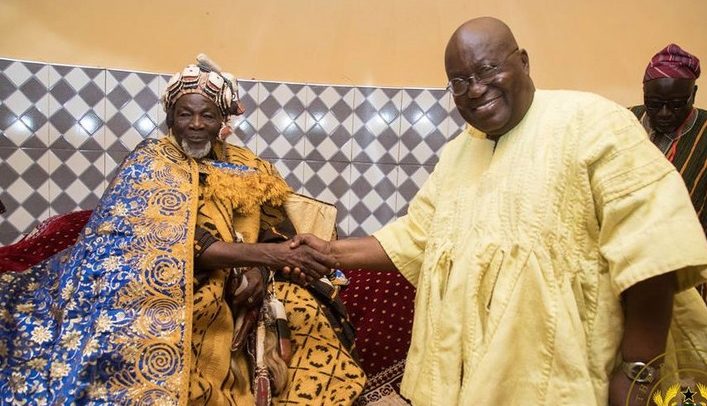When President Nana Addo Dankwa Akufo-Addo turned up in Yendi in the Northern Region adorned in a Dagbon costume, social media cranked into action as the picture went virile.
The ‘Bingbnmaa’ for the top, the ‘Kulgu’ for the trousers with the large base and the ‘Mugri’ for the footwear which is akin to the horse rider’s shoes, formed the Dagbon costume which the President wore showing that he too was part of the official coronation of Nyab Yoo Naa Abukari Mahama as Yaa Naa.
The cotton stuff for the top comes in an assortment of colours and designs; they are hand-woven with varying qualities.
What the President adorned was of a superior quality and DAILY GUIDE gathered that he wore them in Tamale before landing in Yendi, the traditional capital of Dagbon some 56 miles away.
Many commentators have said that for someone who played a pivotal in the restoration of normalcy in a restive part of the country, of course, the President deserved to be part of the coronation.
His costume reportedly presented to him by the people of Dagbon, represented by the traditional authorities, was “a tangible exhibition of their gratitude for the feat achieved in the eventual enskinment of a Dagbon king.”
Headgear Importance
Some observers say a headgear or ‘Zugpilgu’ would have completed the costume but “maybe those who put the dresses together did not want to be faced with the challenge of which way to fold the cap as the various forms of folding have their respective traditional meanings.”
“When the cap is straight facing skywards it denotes supremacy – a position which only the Yaa Naas can take,” a scholar in Dagbon custom told DAILY GUIDE, adding “a cap folded leftwards or rightwards means the wearer wants peace and abhors confrontation. Perhaps, had President Akufo-Addo worn a cap, he could have taken any of the position, the right or left.”
“A cap folded backwards stands for ‘I don’t fear anybody.’ Adopting this style in a gathering where, for instance, there are chiefs could land the wearer in trouble because of the laden arrogance,” he explained.
Many have said that the feat of the performance of the funerals of the two Yaa Naas and the subsequent filling of the void have earned for the President an all-time rating in a cross-party reality, which is so exhilarating and refreshing.
Colonialism arrived in Dagbon with its elaborate systems of government and traditions intact. The costumes of the people have survived the vagaries of the times; Yendi in particular having been under German colonial administration until the British eventually took over when the former lost its international supremacy after the World War.
By A.R. Gomda


